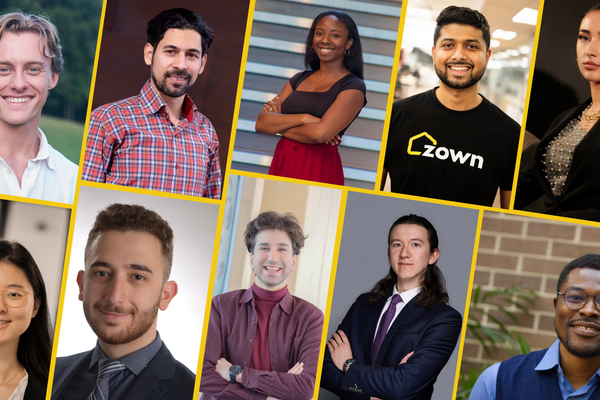
Business lessons from 2020
Alumni share new business practices uncovered by a very unusual year

Alumni share new business practices uncovered by a very unusual year
By Megan Vander Woude Office of AdvancementMaybe you’re working from home, run off your feet with deliveries, or trying to keep up with retail regulations.
Whatever work you do, it’s probably undergone some drastic changes this year.
That’s exactly what alumni discussed at a recent virtual panel hosted by our Toronto alumni chapter. Four entrepreneurs and business experts shared the unexpected changes, challenges and new directions experienced in their industries. Read on for new practices they plan to keep in the future, or watch the full event recording for even more insights.
 “I definitely miss the collaboration I had with teammates in the office,” said Manoj Gandhi (BMath ’08), director of product and business development at Manulife Financial. He looks forward to a day where he can meet with his colleagues in person.
“I definitely miss the collaboration I had with teammates in the office,” said Manoj Gandhi (BMath ’08), director of product and business development at Manulife Financial. He looks forward to a day where he can meet with his colleagues in person.
But the pandemic made many office workers—and their employers—realize how much work could be done in the comfort of their homes.
“I think that coming into the office five days a week—it may not be realistic anymore,” he said. “We might opt for two or three days per week. There’s definitely an advantage to that, in terms of work-life balance.”
Plus, it’s a great perk to attract new talent and keep work-from-home enthusiasts engaged.
 Callum Hay (BSE ’08), co-founder and head brewer at Halo Brewery, misses the buzz of conversation and clinking glasses in the tap room. Shutting its doors was difficult, and cut off one of Halo’s main sales channels. But it also uncovered new opportunities.
Callum Hay (BSE ’08), co-founder and head brewer at Halo Brewery, misses the buzz of conversation and clinking glasses in the tap room. Shutting its doors was difficult, and cut off one of Halo’s main sales channels. But it also uncovered new opportunities.
Halo’s bottle shop sales took off. With a much smaller team to fulfill those orders, they adopted some lean processes to get product out quickly. “I would say the pandemic has refined a lot of things,” said Callum. “We’re using tech from companies like Shopify and Uber Eats to great advantage, and our process for getting online orders out has become a very lean and fast assembly line. Things have evolved in a good way internally.”
Callum and the Halo team plan to continue those processes after the pandemic, including using third-parties to package their product. He hopes that this will divert more attention to practices that make a bigger impact for their sales and business.
 “Through the pandemic, I felt that our ability to empathize and be compassionate to our coworkers has grown,” said Trishala Pillai (BA '16), director of strategy at The Rumie Initiative.
“Through the pandemic, I felt that our ability to empathize and be compassionate to our coworkers has grown,” said Trishala Pillai (BA '16), director of strategy at The Rumie Initiative.
We can’t bump into coworkers at the watercooler, but virtual meetings have exposed us to a small piece of their home lives. The artwork in our backgrounds, pets popping into our screens, and even toddlers demanding a snack—all these things reveal the day-to-day, human side of our lives that allow us to connect in a new way.
“Our human ability to just be there for others and understand what they’re going through has amplified tenfold,” said Trishala. “I hope it will be ingrained in the way we work with each other going forward.”
 Change is inevitable. Mila Banerjee, a Velocity business advisor and founder of Personify AI, believes that the pandemic was a stark reminder to be prepared for what’s coming next.
Change is inevitable. Mila Banerjee, a Velocity business advisor and founder of Personify AI, believes that the pandemic was a stark reminder to be prepared for what’s coming next.
Mila saw entrepreneurial approaches change direction multiple times within the span of the pandemic—and they’re still changing now. Initially, she advised startups to stay lean because venture capitalists were curbing investments. But as time went on, investors began adding to their portfolios again, looking for companies that would thrive in a post-pandemic world.
“We’ve had so many changes and it feels like the change is speeding up,” she explained. “Trying to predict the future in small ways can help us be more nimble. I hope we can keep that lead mentality, keep the idea of being responsive to change.”
Thank you to our affinity sponsor Manulife Financial for making this alumni event possible.

Read more
From transforming solutions for homeownership to advancing health care interventions, Waterloo talent continues to disrupt industries and drive change

Read more
More than 20 founders from Waterloo highlight the newly unveiled list that celebrates those making the biggest impact inside Canadian tech and innovation

Read more
The Kitchener-Waterloo Oktoberfest Rogers Women of the Year awards recognize leaders for outstanding community contributions
The University of Waterloo acknowledges that much of our work takes place on the traditional territory of the Neutral, Anishinaabeg, and Haudenosaunee peoples. Our main campus is situated on the Haldimand Tract, the land granted to the Six Nations that includes six miles on each side of the Grand River. Our active work toward reconciliation takes place across our campuses through research, learning, teaching, and community building, and is co-ordinated within the Office of Indigenous Relations.